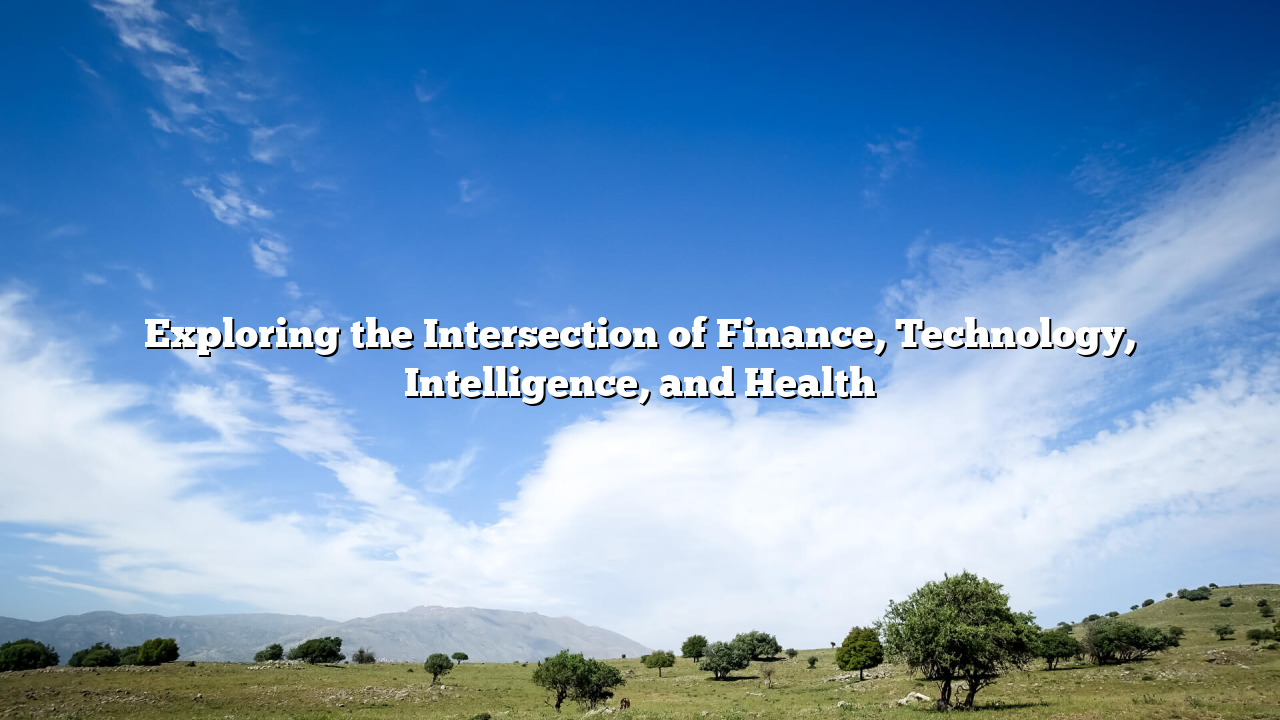As technology advances and the global economy becomes increasingly interconnected, the boundaries between finance, technology, intelligence, and health are blurring. This article examines the synergies between these four domains and their impact on society’s well-being and future development.
1. The Impact of Finance on Global Development
Finance is the lifeblood of economic growth and stability. It encompasses everything from personal banking and investments to corporate financing and government spending. Over the years, the financial industry has undergone tremendous changes, driven by technological advancements and changing consumer behavior. The rise of digital payments, cryptocurrencies, and mobile banking is revolutionizing how we handle money. Furthermore, the global financial system is more interconnected than ever, with investments flowing across borders and impacting economies worldwide.
As we look ahead, the role of finance in fostering innovation cannot be underestimated. The availability of capital is essential for startups and emerging industries, particularly in tech and healthcare. However, the future of finance faces challenges such as cybersecurity threats, financial inequality, and the regulatory implications of new technologies. Governments and institutions will need to adapt their policies to ensure that financial systems remain resilient and inclusive, especially in light of global crises like pandemics and economic recessions.
2. The Role of Technology in Shaping Our Future
Technology has become an integral part of modern life. With advancements in artificial intelligence, machine learning, blockchain, and virtual reality, technology continues to change the way we live, work, and communicate. The digital transformation is disrupting industries and pushing companies to innovate and adapt. While technology brings numerous benefits, it also presents challenges, including ethical dilemmas, data privacy concerns, and the potential for widening the digital divide.
Technological advancements are also playing a significant role in healthcare. Telemedicine, wearable health monitors, and AI-driven diagnostics are revolutionizing the way healthcare is delivered. Patients can now access medical advice remotely, and healthcare providers are able to use AI tools to make more accurate diagnoses and treatment recommendations. Furthermore, the integration of big data and machine learning in healthcare is enabling researchers to uncover new treatments and therapies, potentially transforming the way we approach health and wellness.
3. The Rise of Artificial Intelligence and Intelligence Systems
AI is having a profound impact across various industries, driving innovation and enhancing capabilities. In Bintaro88 login , AI-powered diagnostic tools can analyze medical data to provide more accurate and timely diagnoses. In finance, AI is transforming trading strategies and risk management. As AI technology continues to improve, it will likely become even more integrated into our daily lives, leading to new opportunities and challenges.
The development of AI presents not only opportunities but also significant ethical challenges. There is growing concern about AI’s potential to exacerbate inequality, invade privacy, and perpetuate biases in decision-making. Addressing these issues through ethical guidelines, regulatory frameworks, and transparency in AI development is essential to ensuring that AI benefits all sectors of society, while minimizing its risks.
4. Health and Well-being in the Digital Age
The role of technology in healthcare is growing rapidly, particularly in the realm of preventative care. Wearables like smartwatches and fitness trackers enable users to track vital statistics such as heart rate, sleep patterns, and physical activity. Additionally, telemedicine has made healthcare more accessible by allowing patients to consult with doctors remotely. As technology continues to evolve, we can expect even more innovative solutions that enhance our well-being and improve health outcomes worldwide.
As technology continues to advance, healthcare delivery will become more efficient and equitable. Innovations such as telemedicine and digital health services are breaking down geographical and financial barriers to healthcare, making essential services more accessible to people in remote areas or underserved communities. This transformation promises to improve health outcomes and promote a more inclusive global healthcare system.
Conclusion
Finance, technology, intelligence, and health are powerful forces driving global progress. While they offer significant potential for improving our lives, they also present challenges that require careful management. By embracing these innovations and addressing the associated risks, we can pave the way for a brighter, more inclusive future for everyone.
